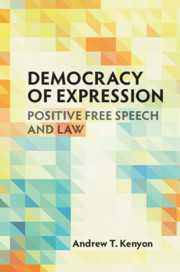Book contents
- Democracy of Expression
- Democracy of Expression
- Copyright page
- Contents
- Preface
- 1 Introduction
- 2 Positive Free Speech from Media Studies and Law
- 3 Positive Free Speech and Democracy
- 4 Positive Human Rights and Political Freedom
- 5 US Legal Writing on Positive Free Speech
- 6 German Broadcasting Freedom
- 7 French Freedom of Communication and Pluralism
- 8 Framing Communicative Freedom
- Bibliography
- Index
1 - Introduction
Published online by Cambridge University Press: 28 May 2021
- Democracy of Expression
- Democracy of Expression
- Copyright page
- Contents
- Preface
- 1 Introduction
- 2 Positive Free Speech from Media Studies and Law
- 3 Positive Free Speech and Democracy
- 4 Positive Human Rights and Political Freedom
- 5 US Legal Writing on Positive Free Speech
- 6 German Broadcasting Freedom
- 7 French Freedom of Communication and Pluralism
- 8 Framing Communicative Freedom
- Bibliography
- Index
Summary
This chapter outlines the structural diversity of public speech that democratic government requires, and the claim that democracy entails positive freedom of communication, not only a negative freedom or liberty. The state has obligations to support communicative freedom; both positive and negative dimensions of free speech need protection for democracy to have substantial communicative legitimacy. This book, often using historical comparative material, examines speech and varied forms of democracy; what it would mean for society to have a voice, formulate judgments and make claims of government that are heard; and free speech law’s role in the voice, judgments and claims. The chapter explains terminology, challenges in the approach and sources used: media studies, human rights, political theory and legal writing and case law. Further possible sources are considered, including analyses based on communication rights and republican freedom. The book is not an exegesis of any one legal system but explores ideas and techniques relevant to positive dimensions of free speech. The aim is show how law should treat positive free speech and raise questions for democratic systems.
Keywords
- Type
- Chapter
- Information
- Democracy of ExpressionPositive Free Speech and Law, pp. 1 - 37Publisher: Cambridge University PressPrint publication year: 2021

